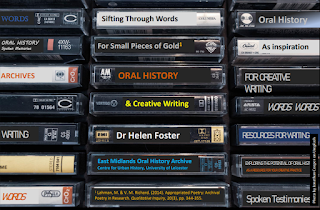By Helen Foster
Oral history is the practice of recording and preserving the memories of people through interviews. These voices can be those often under-represented in other forms of recorded history, including working class people, women, disabled people, black and minority ethnic groups and the LGBTQ community.
Many creative practitioners work with oral history, particularly dramatists and poets. Some go out and record their own interviews and use these in writing and performance. But the potential of material already held in oral history archives is often overlooked. There are thousands of recordings stored at repositories up and down the country. Many are free to access online offering a ready-made resource to inspire the creative writer.
An oral history interview captures the authenticity that lies in the lived personal experiences of the interviewee. It emphasises the fact that we all experience history differently. Listen in and you can stumble across wonderful subjective moments – anecdotes and jokes – that are open to creative reinterpretation.
You may find some oral histories resonate with your own personal histories; listening to a recording about a place you knew as a child may trigger your own memories of that place, which in turn may seep into your writing.
It’s not just the anecdotes and stories captured in the archives that can spark creativity. There is the language itself: the words that interviewees use and the ways in which they use them. The seams of vernacular that can run through interviews in the form of accent and dialect words can open up ideas around creative dialogue. The imagery and sensory descriptions that interviewees conjure up can be used as writing prompts.
Writers have a responsibility to work ethically with oral history. Don’t pick chunks of testimony out of an interview and embed it in your creative work. Cherry-pick words, phrases and ideas and use these as starting points for your own responses. Avoid lifting the interviewee out of the recording and turning them into a character in your writing: allow their personality to influence your ideas, by all means, but take a composite approach to character development. Just remember to tread carefully and be respectful of the memories which have been so generously shared for the archive.
You can find oral histories online. Try British Library Sounds for starters. This has recordings from across the UK and further afield. Their Unlocking Our Sound Heritage project has been digitising analogue recordings from across the UK. For more local content, the University of Leicester’s Special Collections Online holds a range of material from the region, including a range of material for the East Midlands Oral History Archive.
Contact local archives and libraries to see if they hold any collections. This material is likely to have been collected locally, so consider widening your search if you are interested in material from other parts of the country.
The majority of oral history remains in analogue format so you may have to find appropriate equipment in order to listen to recordings on cassette tape for example. You may be given transcripts of interviews. These are useful navigational tools, but are not substitutes for the original audio recording. Whenever you can, listen to oral history recordings rather than relying on transcripts. You may decide to create your own oral histories as part of your writing project. The Oral History Society offers advice and training on all aspects of oral history and is your first port of call for up-to-date information on making sure that your work is legal and ethical.
About the author
Dr Helen Foster is a writer and researcher at the University of Leicester, currently working on the Wellcome Trust ISSF project, Sharing Stories: Developing a Wellbeing Approach to Gathering Midlife Narratives. She is also being funded by an ESRC grant to write Menopaurus: Words that Women Use to Talk about Menopause. Helen holds a PhD in Creative Writing and her fiction has been published in Mslexia and performed at the Edinburgh International Book Festival.



No comments:
Post a Comment